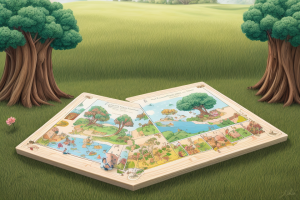
Have you ever wondered about the origins of your favorite board games? From Monopoly to Scrabble, these games have been entertaining us for generations. But when did they first come into existence? Join us as we embark on a journey through time to uncover the fascinating history of board games. Get ready to discover how these humble pastimes have evolved over the centuries, and the impact they’ve had on our lives. So, let’s roll the dice and dive into the world of board games!
Board games have a long and rich history, with origins dating back to ancient civilizations such as Egypt and Greece. However, the modern board game as we know it today began to take shape in the 19th century. In Europe, games like chess and Go had been popular for centuries, but it was during this time that new games like Monopoly and Clue began to emerge. These games were often designed to be played by multiple players and involved strategy, luck, and problem-solving. Today, board games continue to be a popular form of entertainment, with new games being created all the time and classic games still being enjoyed by people of all ages.
The history of board games
Early board games
Games of chance
Board games that are based on chance have been around for centuries. Some of the earliest recorded dice games date back to ancient Egypt, where they were used as a form of entertainment for the wealthy elite. These games were often played with knucklebones, which were the talus bones of sheep, and were used to predict the future or determine the guilt or innocence of individuals in court cases.
Dice games
Dice games have been played for thousands of years and have been found in many different cultures around the world. One of the earliest known dice games is called “Hurling,” which was played in ancient Greece and involved players throwing dice to determine the outcome of a game. Another popular dice game from ancient Rome was called “Snakes and Ladders,” which is still played today in many different variations.
Card games
Card games have also been around for centuries and have been played in many different cultures. The earliest known card games were played in China during the Tang dynasty, where they were used as a form of entertainment for the imperial court. These games were often played with dominoes or cards made from bamboo slips, and were used to bet on the outcome of games.
Games of strategy
Board games that are based on strategy have been around for centuries, with some of the earliest known games dating back to ancient Egypt and Greece. One of the most famous strategy games from ancient Greece is called “Chess,” which has been played for over 1,500 years and is still popular today. Another popular strategy game from ancient China is called “Go,” which is played on a grid of intersecting lines and involves players placing black or white stones on intersections to capture territory.
Mancala
Mancala is a family of board games that are played in many different cultures around the world. These games are typically played with small stones or seeds and involve players moving them around a board with cups or pits. The objective of the game is to capture all of the stones or seeds on the board, and the winner is the player who is able to do so. Mancala games have been played for thousands of years and are still popular today in many different parts of the world.
Evolution of board games
The rise of modern board games
Modern board games have their roots in the late 19th and early 20th centuries. One of the earliest and most popular modern board games is Monopoly, which was first created in 1903 by an American woman named Elizabeth Magie. The game was originally called “The Landlord’s Game” and was designed to illustrate the economic concepts of land ownership and monopolies.
Another popular modern board game is Scrabble, which was first invented in 1938 by an American architect named Alfred Butts. Butts created the game as a way to relieve his boredom during the Great Depression. He developed a set of letter tiles with different point values and created a board with a grid of letters. Players take turns placing tiles on the board to create words and earn points.
Risk is another well-known modern board game that was first created in 1959 by the French film director Albert Lamorisse. The game is based on the concept of global domination and involves players strategically placing their armies on a map of the world. The game has been widely popular and has undergone several revisions over the years.
The influence of technology
With the advent of technology, board games have evolved to include digital versions of classic games. These digital versions offer new and exciting ways to play, such as online multiplayer mode, different levels of difficulty, and interactive graphics.
Video games have also had an impact on the evolution of board games. Many video games have incorporated elements of traditional board games, such as strategy and problem-solving, into their gameplay. Some video games, such as Minecraft, have even been described as a form of digital board game.
Digital board games have also been developed, which allow players to play their favorite board games on their computer or mobile device. These digital versions offer the convenience of being able to play whenever and wherever, as well as the ability to play against other players online.
The significance of board games
The benefits of playing board games
Social interaction
Playing board games can be a great way to foster social interaction among friends and family. It provides an opportunity for people to come together, engage in a shared activity, and connect with one another in a meaningful way. Board games can be played with any number of players, from two to many, and they often involve teamwork, cooperation, and communication. Whether you’re playing a game of strategy, a party game, or a game of chance, the social aspect of board games is a key component of their appeal.
Cognitive development
Board games can also provide a number of cognitive benefits. Many games require players to think critically and strategically, and they can help to improve problem-solving skills, spatial reasoning, and decision-making abilities. Some games also involve memory and pattern recognition, which can help to improve these skills as well. Playing board games can be a fun and engaging way to challenge the mind and keep it sharp.
Emotional well-being
In addition to the cognitive benefits, playing board games can also have a positive impact on emotional well-being. Many games involve elements of luck and chance, which can help to reduce stress and anxiety. Additionally, the social interaction and teamwork involved in many board games can boost feelings of connection and belonging, which can have a positive impact on overall emotional well-being. Playing board games can be a fun and enjoyable way to take a break from the stresses of daily life and improve emotional well-being.
The impact of board games on society
Cultural influence
Board games have had a profound impact on society, shaping culture and influencing the way people think and behave. One of the most significant cultural influences of board games is their thematic content. Many board games are based on historical events, myths, and legends, and they often reflect the values and beliefs of the societies that created them. For example, the game of chess, which originated in India, is based on the struggle between good and evil, while the game of Go, which originated in China, is based on the principles of balance and harmony.
In addition to their thematic content, board games have also played a significant role in shaping cultural practices and traditions. For example, in many parts of the world, board games are played during holidays and special occasions, and they are often passed down from generation to generation as part of family traditions.
Another significant cultural influence of board games is the establishment of board game conventions. These conventions bring together players and designers from all over the world to share their passion for board games and to showcase new and innovative designs. These conventions have helped to create a thriving community of board game enthusiasts, and they have also helped to promote the development of new and exciting board game designs.
Economic impact
The impact of board games on society is not limited to their cultural influence. Board games have also had a significant economic impact, creating jobs and generating revenue for local and national economies. The board game industry is a growing industry, with an estimated global market value of over $10 billion. This value is driven by the demand for new and innovative board game designs, as well as the growing popularity of board game cafes and local game stores.
Local game stores, in particular, have played a significant role in the economic impact of board games. These stores provide a space for players to play and purchase board games, and they also serve as a hub for the local board game community. Many local game stores host events and tournaments, and they often collaborate with board game designers to showcase new and innovative designs.
Overall, the impact of board games on society is significant and far-reaching. They have shaped culture and influenced behavior, and they have also had a significant economic impact, creating jobs and generating revenue for local and national economies.
Future of board games
Emerging trends in board games
Cooperative games
Cooperative games have become increasingly popular in recent years. These games are designed to encourage teamwork and collaboration among players, rather than competition. In cooperative games, players work together to achieve a common goal, often against a shared opponent or obstacle. This type of gameplay can help build social connections and promote positive relationships among players. Examples of popular cooperative board games include Pandemic, Forbidden Island, and Ghost Stories.
Expansion of themes
Another emerging trend in board games is the expansion of themes. Many board games now explore complex themes and subject matter, such as social issues, politics, and history. These games often include more mature content and may be better suited for older players. Some popular games that explore mature themes include Twilight Struggle, 1960: The Making of the President, and Forsythia.
Integration of technology
Technology has also played a role in the evolution of board games. Some board games now incorporate electronic components, such as digital displays or augmented reality, to enhance gameplay. Other games use smartphone apps or online platforms to facilitate play and connect players from around the world. Examples of board games that integrate technology include Steam, Ticket to Ride: First Journey, and Mansions of Madness.
Overall, these emerging trends in board games are helping to keep the hobby fresh and exciting for players of all ages. As technology continues to advance and new themes are explored, it will be interesting to see how board games continue to evolve.
The enduring appeal of board games
Board games have been around for centuries, and despite the advances in technology, they continue to hold a special place in the hearts of many people. There are several reasons why board games have such enduring appeal.
Timeless appeal of board games
One reason why board games have enduring appeal is that they are timeless. They have been around for centuries, and even though the games themselves may change, the basic principles remain the same. Many classic board games, such as Monopoly and Scrabble, have been enjoyed by generations of families, and they continue to be popular today. This timeless appeal is one of the reasons why people continue to play board games, even in a world where there are so many other forms of entertainment available.
The resurgence of interest in board games
Another reason why board games have enduring appeal is that there has been a resurgence of interest in them in recent years. This is partly due to the fact that technology has made it easier for people to learn about and play board games from all over the world. Online retailers and social media platforms have made it easier for people to discover new games and connect with other players. Additionally, many people are looking for ways to disconnect from technology and spend more time with their families and friends, and board games provide a way to do this. This resurgence of interest in board games has led to a renaissance of sorts, with new games being created and old games being reimagined with new mechanics and themes.
Overall, the enduring appeal of board games can be attributed to their timelessness and their ability to bring people together. Whether you are looking for a way to connect with your family and friends or simply want to escape from technology for a while, board games provide a unique and enjoyable experience that is sure to endure for many years to come.
FAQs
1. When did board games originate?
Board games have a long and rich history, with origins dating back to ancient civilizations. The earliest known board games were discovered in ancient Egypt and date back to around 3100 BC. These games were simple affairs, carved into pieces of wood or ivory and designed to be played by two people. Over time, board games evolved and became more complex, with different cultures developing their own unique games with their own set of rules and game pieces.
2. What were the first board games?
The earliest known board games were simple affairs, such as the ancient Egyptian game of Senet, which was played by two people. Senet was played on a board that was carved into pieces of wood or ivory, and the game pieces were typically carved from wood or ivory as well. Other ancient board games include the Indian game of Chess, which dates back to the 6th century AD, and the ancient Chinese game of Go, which dates back to around 2300 BC.
3. How have board games evolved over time?
Over time, board games have become more complex and sophisticated, with different cultures developing their own unique games with their own set of rules and game pieces. In the Middle Ages, board games such as chess and backgammon became popular in Europe, and in the 19th century, games such as Monopoly and Risk were invented. Today, there are thousands of different board games available, ranging from classic games to modern games with electronic components.
4. What is the purpose of board games?
The purpose of board games is to provide entertainment and challenge for players. Board games can be played by people of all ages and skill levels, and they can be played alone or with others. Some board games are designed to be educational, while others are designed to be purely for fun. Board games can also be used as a tool for teaching and learning, as they can help players develop strategic thinking, problem-solving skills, and social interaction.







